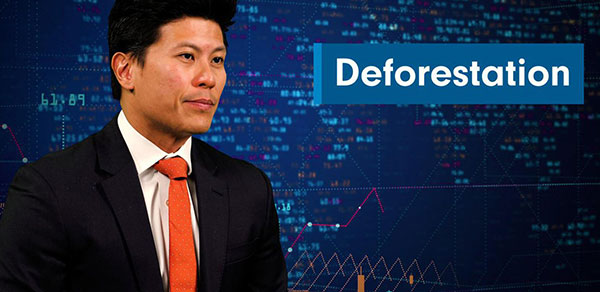Fidelity International - ESG Outlook 2022: Three key priorities in sustainable investing
An investor’s guide to the year ahead across environmental, social and governance (ESG) factors - including the key themes of deforestation, the just transition and double materiality.

Three key themes
For investors focused on sustainability, 2021 was a year dominated by the runup to and takeaways from November’s COP26 climate change negotiations in Glasgow, Scotland.
But the true test is just beginning now: What actions will countries take to deliver on their pledges, not only in terms of emission cuts but in preserving our biological diversity and ensuring a fair and equitable transition to a low carbon world? As we head into 2022, we see three big themes coming into greater focus: deforestation, the just transition and double materiality.
No. 1: Deforestation
Ending deforestation is critical to curbing climate change and protecting the world’s biodiversity. Reducing greenhouse gas emissions is only part of the battle; we also need to actively remove carbon from the atmosphere if we’re to stand a chance of meeting mid-century global targets for curtailing global warming and achieving net zero.
One of the simplest and most effective ways of removing carbon from the atmosphere is a natural one: ending deforestation. Globally, natural capital has been undervalued for decades. And it’s not only the emission cuts that forests bring - they are also home to most of the world’s terrestrial biodiversity and support the food security, jobs and livelihoods of many millions of people across the world. One encouraging highlight from COP26 was a commitment from more than 100 world leaders to end deforestation by 2030. But as investors we think we can be more proactive in this regard. Specifically:
- At COP26 in Glasgow, Fidelity joined over 30 financial institutions representing more than US$8.7 trillion in assets under management in signing a pledge to eliminate agricultural commodity-driven deforestation risks across our investment portfolios by 2025. This pledge puts a focus on key ‘forest-risk’ agricultural commodities like palm oil, soy, beef and leather, pulp and paper, and starts with an exposure assessment to be completed by the end of 2022.
No. 2: The just transition
Rich countries grew rich on the back of the carbon emissions created through industrialisation. It is right that they are now leading the decarbonisation charge. But the drive to net zero shouldn’t prevent developing economies from developing or employees who are displaced by greener technologies from finding meaningful work.
This is what we mean by a just transition. The private sector has a key role to play in facilitating the shift to clean energy, but in a way that scales genuine alternatives for baseload power generation in the many countries that remain dependent on fossil fuels while also addressing the social challenges for workers and communities impacted by the transition. The race to net zero can’t afford to leave anyone behind.
No. 3: Double materiality
Double materiality recognises that companies are not only responsible for managing the financial risk of the social and environmental factors upon which they depend - it also means that companies are responsible for the actual impact that their business has on people and the planet. As investors driven by fundamental research, we are seeking to embed this principle of double materiality in the next iteration of our proprietary forward-looking sustainability ratings, and to integrate the non-financial impact of our decisions as investors.
Click to read the full outlook
Important Information:
The value of the fund's assets will go down as well as up. This will cause the value of your investment to fall as well as rise and you may get back less than you originally invested.
_______________________________________________________________________
For more information about Fidelity International visit www.fidelityinternational.com/